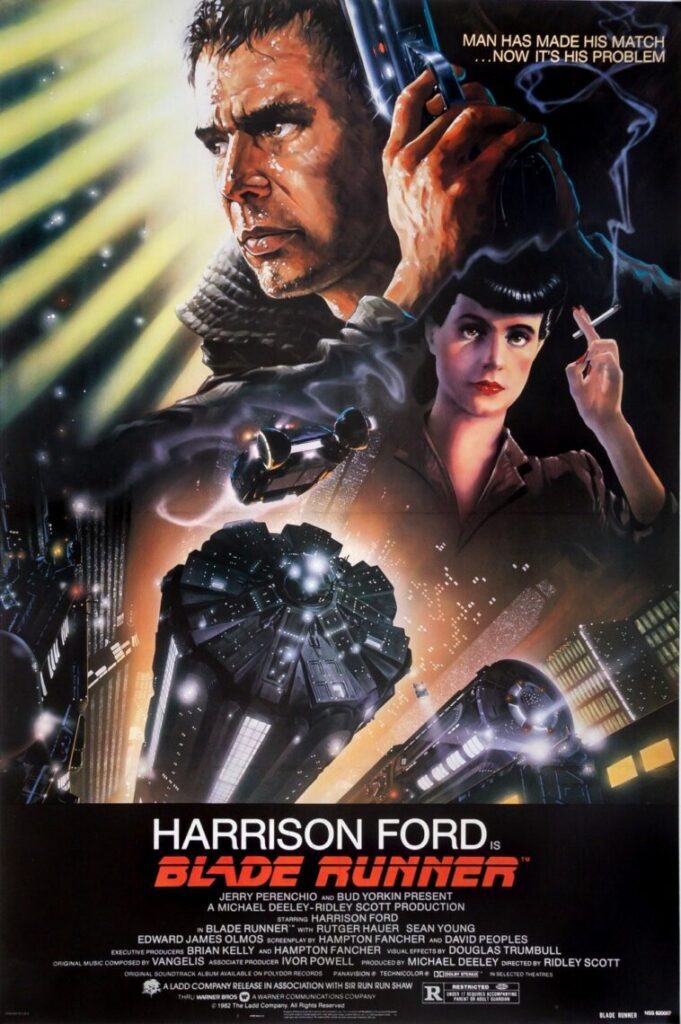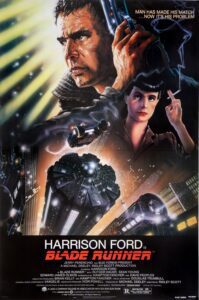
MPAA Rating: R/Genre: Sci-Fi Neo Noir/Stars: Harrison Ford, Rutger Hauer, Sean Young, Edward James Olmos, M. Emmet Walsh, Daryl Hannah, William Sanderson, Brion James, Joe Turkel, Joanna Cassidy, James Hong, Morgan Paull, Hy Pyke/ Runtime: 117 minutes
Honestly what can I possibly say about 1982’s iconic sci-fi masterpiece Blade Runner that countless others haven’t already said? Well for starters I can guarantee that when you watch it for the very first time, you might just find yourself baffled since you might be going in under the assumption that this film is a typical 80s sci-fi futuristic run and gun kind of film only to discover far too late that this movie is most assuredly not that kind of movie so those of you looking for an adrenaline fix please look elsewhere. The same should also be said if you are looking for a movie containing a healthy amount of either fancy gadgets, huge explosions, or narratives that explain everything to you by film’s end because this is not that kind of movie. Rather, this is a slice of cinematic pie that manages to be one of the deepest films ever put to celluloid due in no small part to the collection of questions it asks about the nature of humanity and just what it means to be human. Suffice it to say this film is able to be one of only a few that has truly been to give an audience both a riveting story and also some very immersive and thought-provoking questions to consider and then aided those ingredients with support from an extremely well-written script, performances that are out of this world, and phenomenal work done behind the camera which results in the creation of one of the most intriguing worlds in the history of sci-fi cinema thus resulting in a movie that is no more and no less than genuine cinematic magic.
The plot is as follows: Blade Runner takes us to a possible future for our species where the year is 2019 and Earth has managed to become a downright disaster both naturally and in terms of the amount of people living on her. Indeed it is so bad that the sun is rarely able to make its presence known through all the disgusting smog and pollution plus it rains more than we might like it to. As a result, things are really quite miserable for the people still living on our little celestial ball. It is also in this decaying and overpopulated world however where we see that researchers for the seemingly omnipresent Tyrell Corporation have managed to construct advanced humanoid robots called replicants in order to be used as slave labor for the more perilous jobs at colonies on some of the other planets. However we learn that in the aftermath of a particularly brutal uprising by the replicants, they are not allowed to exist on Earth and a unique branch of law enforcement called “blade runners” are created to “retire” any replicant that makes their way to our planet. Thus we see that when a quartet of the latest replicant model, led by one calling himself (?) Roy Batty finds their way to Earth, a legendary yet retired blade runner by the name of Rick Deckard is summoned by his former boss, one Captain Bryant, to aid him in finding them and dispatching them as quickly as possible. Thus finding himself working alongside an enigmatic fellow agent with a fondness for origami by the name of Gaff, we see that Deckard is assigned to head over to the HQ for the Tyrell Corporation in order to ensure that the test being utilized to id those who are and who aren’t replicants is able to successfully detect replicants that are what is known as the Nexus-6 model. There he meets the brains behind the business Dr. Eldon Tyrell and his quite lovely aide of sorts Rachael. However, following some gentle yet firm prodding from Tyrell, Deckard is able to astonishingly discover that Rachael is also a replicant with a caveat attached. That being that, unlike most other replicants, Rachael give or take has always been under the assumption she was a flesh and blood person like you or I due to being outfitted with genuine human memories. As a result, we see this female robot get quite close with Deckard since he is the only other human being beside Tyrell that she has come into personal contact with. An action that will not only make Deckard’s assignment a bit more complicated than usual, but also change his life, and also quite possibly the course of the world around them forever….
Now although a lot of this slice of cinematic pie’s narrative deals with the perilous search undertaken by Deckard to find the quartet of replicants that have escaped and are on the loose, I strongly feel it is the uneasy dynamic between humanity and replicants that really aids in showcasing just what this movie is about at its core. That’s because this slice of cinematic pie really does aim and succeed at making it very unclear on just what being a human being is all about. Indeed as seen in this ominous and bleak world of tomorrow (at least by 1982’s standards), technology developed by mankind has all but annihilated the planet and every other living thing on it (hence robot owls and snakes). Thus by managing to develop genetically engineered humanesque robots to do all the hazardous jobs on other planets what would it say about us as a species if these beings were to become independent and develop free will? Indeed are they still expendable and should be seen as nothing more than a technological advancement that our species can utilize as a cheap labor force seeing as they have no emotions or humanity to them whatsoever despite looking very much like us? Or is it possible that they have managed to evolve and become closer to the epitome of what it means to be human than even we, their creators, could ever hope to achieve? Indeed there is a moment in this film that is seems to hint at a certain answer courtesy of Batty crying over one of his fellow replicants’ recently deceased body and this seems to suggest that maybe just maybe the replicants are more human than the beings that made them and exist alongside them could ever hope to be. It is also for that very reason that Batty’s last scene in the movie is easily one of the most poignant and potent in the whole film as it really does put this antagonist’s part in this society in a light that is equal parts more clear yet more tragic and heartwrenching as well.
I also feel it should be said that in regards to the work done by Sir Ridley Scott and his team behind the camera this slice of cinematic pie is an absolute marvel. Indeed even when I was younger I was always blown away by how extraordinary this slice of cinematic pie’s production design really truly is even to this day. Indeed thick cloud-like steam pumps with reckless abandon from practically everywhere you look, glaring neon signs light the streets through the mix of smoke and smog, tall and unappealing skyscrapers attempt to try and push past the bleak horizon as if to get a glimpse of Heaven, and dirty rain falls freely from the sky across litter-cluttered avenues and boulevards in a future take on L.A. that is meant to look more in the vein of a place like Tokyo had it given way to horrific overpopulation and gross amounts of pollution literally everywhere you looked. It’s also worth pointing out that the atmosphere that is presented in this film is quite distinct as everything that happens is given a potent degree of gravity to it. Indeed not only is there a vibe of trepidation, prejudice, and oppression throughout virtually the whole movie, but there is also a distinct mood that is equal parts anxiety, terror, and just plain dehumanizing throughout that manages to permeate its way through every single frame. Finally, I should also point out that the music of Blade Runner is also a remarkable thing to behold. Indeed the pulse-like electronic score this film is provided with by Vangelis does a wonderful job of matching up beautifully with the bleak events that occur in the film and further aid the ominous film noir components this iconic slice of cinematic pie is operating with. Suffice it to say that the work done behind the camera is downright phenomenal, but it’s also terrifyingly realistic and it all still holds up amazingly well.
Of course, as legendary as the work done behind the camera is, I think this movie would still only work half as well if it didn’t have the absolutely wonderful and beautifully realized performances in front of the camera as well. This starts with Harrison Ford in one of the most iconic performances of his career as Rick Deckard. Indeed Ford, able to juggle the weariness, inner reflection, and gruff exterior of this character incredibly well, brilliantly gives us an emotionless man who starts out completely indifferent to Replicants and their struggles until his meeting Rachael really hits a long buried nerve within him that starts to make him question what limits (if any) these replicants have in trying to be just like us whilst also making him slowly, but surely start to both question his own bonds with society as he knows it and also gain a much deeper respect for just what it means to truly be a human being. I also feel that Rutger Hauer as Roy Batty was spot on casting as well. Indeed not only is Hauer’s Roy a riveting and equal parts brutal and intellectual villain to Ford’s gruff yet determined antihero, but he also quite intriguingly has many human qualities that the human Deckard himself no longer has or seemingly no longer wants to possess. Thus in many respects there is a riveting parallel to be found between our human hero who is more machine than man rediscovering his lost humanity and his quarry who, despite being built rather than born, is more human than our hero could ever truly hope to be. We also get wonderful support work in this from Sean Young who as Rachael really gives this movie a sense of heart that it desperately needs, Joe Turkel who is riveting in his 30-35 minutes of screen time tops as the enigmatic Eldon Tyrell, Edward James Olmos as Gaff who gives us one of the most profound and thought-provoking statements of the whole movie, and M. Emmet Walsh who does dependably good work as Deckard’s slightly shifty former boss Captain Bryant. Suffice it to say that the work done by the filmmaker and his team behind the camera in bringing this world to life may initially be what draws you into the movie, but it’s the work done by the phenomenally talented cast that makes you want to stay awhile.
All in all Blade Runner is a truly iconic slice of cinematic pie to say nothing of a groundbreaking entry in the world of science fiction cinema. Indeed I can say beyond and any doubt that this slice of cinematic pie is easily one of the finest sci-fi movies ever made. Indeed it’s wonderfully ingenious union of both the science fiction and film noir genres of movie magic is an incredible partnership to say nothing of delightfully hinting at the eventual rise of what has come to be known as the cyperpunk subgenre of film. A genre that would eventually produce another one of the best sci-fi movies ever made in the form of a little slice of cinematic pie known as The Matrix. As for Blade Runner, yes its bleak and quite complicated material might have left audiences completely and utterly baffled when it first came out, but like other slices of cinematic pie of a similar ilk, it really has managed to ride out the storm of time in such a manner that it has managed to emerge as a favorite of both critics and general movie going audiences alike. Suffice it to say then that, thanks to a riveting narrative that will leave you quite a bit to ponder and phenomenal work on both sides of the camera in bringing this truly incredible world vividly to life, Blade Runner is not just a genuinely iconic film. Rather it is also no more and no less proof that movie magic is a very real and very amazing thing when audiences are blessed enough to receive it. On a scale of 1-5 I give Blade Runner “82” a solid 4.5 out of 5.



